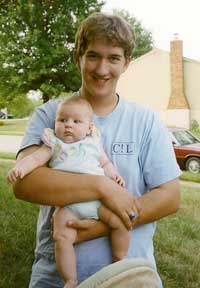Bithalamic Brain Tumor: Ben Rudy Maintains Optimism Throughout
“I just took an optimistic approach.”
It's been over a year since 18-year-old Ben Rudy was first diagnosed with a brain tumor. At the time, Ben was relaxing over summer break and looking forward to his senior year at St. Xavier High School in Cincinnati, Ohio. Chemotherapy and radiation treatment were the farthest things from his mind.
Then, during a regular check-up visit to an eye doctor, swelling was detected behind the optic nerve in Ben’s eye. A subsequent MRI revealed the brain tumor, and following the family doctor’s recommendation, the Rudy family came to Cincinnati Children’s Hospital Medical Center for treatment.
Joined by his parents, Dennis and Cathy, Ben soon found himself talking with Kerry Crone, MD, a neurological surgeon with Cincinnati Children’s. A brain tumor biopsy was soon performed and the family received the good news that the tumor was benign. But due to its location in the brain, the tumor will remain a part of Ben for the rest of his life.
“They couldn’t surgically remove it because it’s in the thalamus – basically in the dead center of the brain,” Ben explains.
The news that the tumor was benign was obviously a relief for Ben and his family, but he still faced the reality of immediate chemotherapy, radiation treatment and regularly scheduled MRIs.
According to Lars Wagner, MD, who is Ben’s primary neuro-oncologist and directly coordinates and oversees his care, the treatment plan is necessary because of the nature of the bithalamic tumor, which involves the right and left sides of the thalamus. Located in the center of the brain, the thalamus is a critical relay station for neurons traveling from the cerebral cortex to the rest of the brain. Therefore, it is difficult to surgically remove a bithalamic tumor without causing permanent neurological deficit, such as weakness on one side, Dr. Wagner points out.
“This is complicated further if the tumor is found on both sides of the thalamus,” adds Dr. Wagner. “Without surgery as an option, we have to rely on radiation and chemotherapy to control the growth of the tumor.”
Ben reacted to his treatment regimen with a healthy dose of reality and positive thinking.
“Every 3 months I’ll have an MRI, for the rest of my life pretty much. Except they’ll probably increase the amount of time between each MRI as time goes on,” Ben says. “The MRIs are not that bad. It’s just an hour. I’m a very optimistic person.”
Treatment Begins
“Really I just feel bad, looking around and seeing all these parents walking around with their kids,” says Ben, who is well aware that many patients aren’t as lucky as he is. “I don't have any of the negative symptoms and can pretty much just continue living my normal life. Some of these families have had to change to a lifestyle of almost always being at the hospital.”
Healthy Living
From the very beginning, when he wasn’t sure if the brain tumor was cancerous or not, Ben has embraced a positive attitude. He believes this helped in the healing process. “I could’ve just sat there and moped around for the past year. Or I could’ve just gotten over it and faced the fact and dealt with it,” Ben says, recalling his initial diagnosis.
“I pretty much took the mindset of ‘OK, I have a brain tumor. What am I going to do to keep up with my life?’ I was going to try and not let it affect me. I just took an optimistic approach.”
Ben’s father, Dennis, admits he’s learned more about his son over the last year. “He’s a very spiritual person. I have gotten to know that more through this experience than any other,” he says.
Living up to a Reputation
The family’s regular visits to Cincinnati Children’s have only reaffirmed their opinion about the medical center.
“The people have been wonderful. Everything Ben went through – from the initial consultation through his surgery and all of his treatments – we’ve been treated with great respect and all of our questions have been answered,” says Dennis. “There’s a fine reputation [at Cincinnati Children’s] and they certainly lived up to it.”
Ben agrees, noting the easy-going nature of everyone at Cincinnati Children’s, particularly Drs. Crone and Wagner. In fact, Ben describes the entire staff as “friendly,” and he still stays in contact with several members of the hospital staff through email.
“They are all friendly people who just want to make your visit as painless as possible,” says Ben. “One of the things that stands out is the fact that they were willing to change their schedule around so my parents didn't have to take off work. That shows they are there for the reason of helping people, and you can tell they were invested in my case.”
Staying Busy
Today, Ben is a freshman studying mechanical engineering at the University of Louisville. He drives home regularly to Edgewood, Kentucky, to visit family including brother, Nathan, and sister, Allison – but for the most part he stays busy studying, hanging out with friends and volunteering with the school’s Campus Crusade for Christ group.
“It’s a pretty boring life,” says Ben matter-of-factly. This, of course, could be considered a colossal understatement – especially for someone who is only a year removed from a brain tumor diagnosis. But, apparently, that’s Ben.
“Ben has kept on going,” Dennis says. “He hasn’t let it slow him down at all, which is pretty amazing.”

At his home in Northern Kentucky, Ben often babysits for his neighbor's young daughter, Kelsey.
Share Your Story
If you have had an experience with the Cancer and Blood Diseases Institute, we invite you to share your story.





